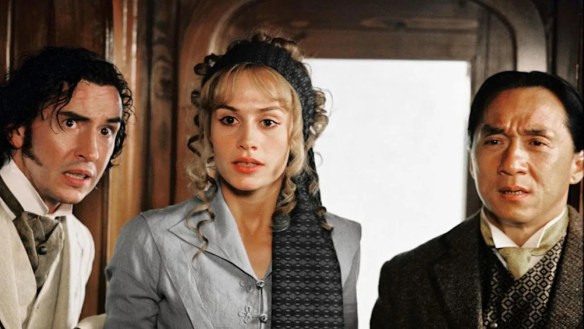Hello folks, and welcome back to Wrong Every Time. This week my housemate has set off on a trip to Germany, meaning I get to watch all the classic anime I couldn’t successfully pitch as group viewings. This has in practice translated to around three hours of Sailor Moon a day, which has by all accounts been a deeply enriching experience so far. Sailor Moon has one of the strongest core production teams of any anime in history, with Junichi Sato, Kunihiko Ikuhara, Takuya Igarashi, and plenty of other legends all elevating the tales of the charmingly unheroic Usagi and her brave companions. The show’s mostly been about the surface pleasures so far, but with a team this good, even the most frivolous of premises offers plenty of strong gags and ridiculous faces. And of course, all this Sailor Moon has been accompanied by a steady diet of cinema as well. Let’s break down some films!
First up this week was Around the World in 80 Days, a 2004 adaptation of Jules Verne’s novel starring Steve Coogan as an eccentric inventor and Jackie Chan as his valet, who are joined by an aspiring artist (Cécile de France) in their journey around the globe. Bearing little resemblance to the novel that is its namesake, 80 Days is simply a rip-roaring adventure filled with pratfalls, acrobatics, and lighthearted bickering between its fairly stupid leads.
80 Days got panned upon release, apparently in large part because it was such a loose interpretation of the novel. I tend to not put much stock in such criticisms; if I wanted a copy of the source material, I’d simply read that source material again, and I’m far more interested in seeing base concepts reframed in such a way as to embrace the strengths of their adopted mediums. In 80 Days’ case, while the Verne influence might be fairly remote, it is abundantly clear what cinematic traditions are being venerated: Monty Python films and Jackie Chan classics.
Those are very good influences, and 80 Days does a fine job of combining them into a family-friendly shell. The script is breezy and entertaining, the cast possesses excellent chemistry, and all three of our leads are given plenty of heroic flourishes and signature gags. The film is generously scattered with ridiculous cameos (Schwarzenegger puts in a particularly absurd turn), and perhaps most importantly, it is clear that Jackie Chan directed his own action scenes. His scenes bounce and weave with the same energy and understanding of technique of his Hong Kong classics, ranging from Buster Keaton-style theatrics to fluid, fast-paced martial arts, including one scene for long-time fans where he dismantles an opponent with his signature wooden bench. Even Sammo Hung shows up!
So yes, if you enjoy Jackie Chan features and are in the mood for a light adventure, 80 Days is absolutely a superior entry in Chan’s American film canon. Why would you want a Jackie Chan movie to resemble a Jules Verne novel, anyway?
My next viewing was the ‘49 adventure film Prince of Foxes, starring Tyrone Power as minor nobleman Andrea Orsini, and Orson Welles as Prince Cesare Borgia, a master manipulator determined to rule all of Italy. Orsini works hard to prove himself as Borgia’s right-hand man, successfully engineering a marriage between Borgia’s sister and a political rival, and then being sent to eliminate the Count Marc Antonio under the premise of an ambassadorship. However, Orsini swiftly falls in love with Antonio’s young wife Camilla (Wanda Hendrix), and finds the count himself a man profoundly worthy of respect. With his loyalties tested, he will have to choose what manner of man he truly is.
Prince of Foxes is a handsomely composed and wittily scripted feature, filmed across as many of the actual textual locations as the production could manage. Power and Hendrix possess an easy, immediate chemistry, and the twists of loyalty and political fortune keep energy reasonably high throughout. However, the greatest pleasure of watching Prince of Foxes is undoubtedly Welles’ turn as the devious Borgia. Welles is perfectly at home playing the Machiavellian prince, savoring the cruelty of his dictates and the poetry of his voice, and demonstrating yet again that the man is simply a first-rate villain. Whether it’s as a conspiring prince, brutal alcoholic (Touch of Evil), or a living embodiment of the darkness (The Third Man), you can count on Welles to gleefully cast some menacing shadows on your production.
Next up was House of 1000 Corpses, Rob Zombie’s debut film feature. Sid Haig, Bill Moseley, and Sheri Moon Zombie all star as family members and inhabitants of the titular house, a den of sin and horror where they commit themselves fully to the devil’s work. With a fresh group of hapless teenagers led to their house by roadside attraction maestro “Captain Spaulding” (Haig’s iconic clown), the film wastes no time introducing its victims to the horrors within, commencing an hour-plus tour of theatrical bloodshed.
1000 Corpses’ influences are clear to see; the film essentially posits “what if the dinner table scene from Texas Chainsaw Massacre was an entire movie,” giving us a full film’s worth of getting to know Leatherface and his extended family. The actual family members are a suitably charismatic collection of freaks, and the southern-fried aesthetic of the original Chainsaw Massacre is here revived through constant cuts, musical interludes, and distortions of frame, an effect similar in impact to Natural Born Killers’ photography. By the end, the horror ramps up into terrors that wouldn’t feel out of place in a Hellraiser sequel, all while maintaining that unnerving focus on a family of self-declared monsters.
It’s loud, it’s tasteless, and it’s extraordinarily generous. For someone whose capacity to be scared has been as experience-dulled as myself, 1000 Corpses provides an absolute feast of white-knuckle interrogations and inventive grotesqueries, brimming with leather costumes of dubious make and gleaming devices of no reputable purpose. Haig, Moseley, and family matriarch Karen Black all put in strong performances as our demented ringleaders, while the cast of victims is furnished with such reliable talents as Rainn Wilson and Walton Goggins. Like Tobe Hooper himself, Zombie’s reaction to The Texas Chainsaw Massacre was clearly “yes, but moreso,” and the greasier end of horror cinema is richer for it.
I followed that up with Zombie’s sequel to House of 1000 Corpses, The Devil’s Rejects. This film finds Captain Spaulding’s family on the run after their murder mansion is hit in a police raid, with Spaulding (Sid Haig), Otis (Bill Moseley), and Baby (Sheri Moon Zombie) fleeing from motel to motel, leaving a trail of bodies along the way. Hot on their trail is Sheriff John Wydell (William Forsythe), whose quest to avenge his brother will draw him into the same darkness that consumes his targets.
The Devil’s Rejects is certainly a more accomplished directorial achievement than 1000 Corpses, trading in its predecessors’ surfeit of carnival house horrors for a lean, unnerving road drama, its camerawork as sparse and unsparing as its desert vistas. Removing so much of the Hammer Horror artifice of the family’s home has the surprising effect of making them seem more terrifying; they’re no longer clowns in a circus, they are three dangerous people with weapons who have held us up in our motel room. With no overtly preposterous grotesqueries to create a sense of dramatic distance, the stakes feel higher and violence more intimate; I felt genuinely uncomfortable throughout this film’s central abduction sequence, in the same way Funny Games or The Strangers casts mundane backgrounds in an unsettling new light.
Of course, this is still a carnival of horror, and thus there are plenty of garish filtered montages and rambling soliloquies from our titular devils. Such disarming theatrics contrast gracefully against the encroaching madness of the rejects’ pursuer, resulting in a finale where you almost feel afraid for this monstrous clan. The rejects see themselves as hellish incarnations of Butch Cassidy and the Sundance Kid, and in this film’s gloriously indulgent finale, if you squint just right, you can see it too. The Devil’s Rejects proves Rob Zombie isn’t just a lover of horror cinema; he’s a distinct horror voice in his own right.



